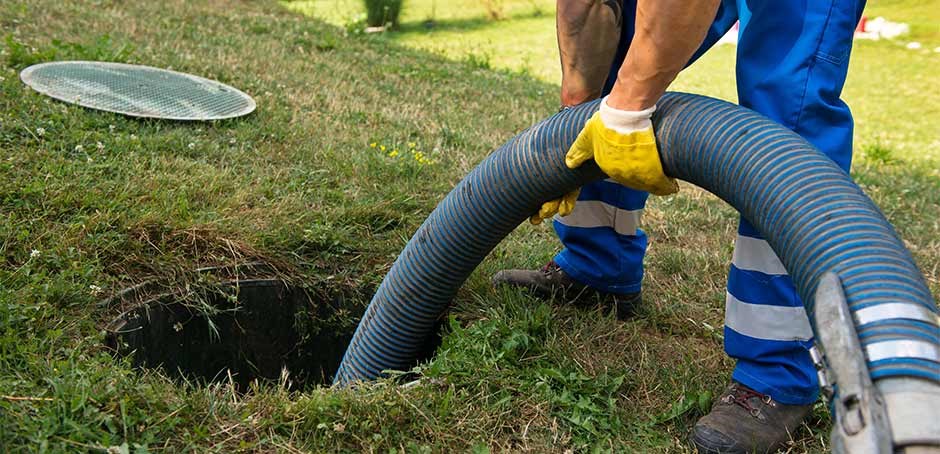What's needed for a new septic installation?
To install a new septic system, you need to get an improvement permit (I.P.) and a construction authorization (C.A.) from the county you plan to live in. In many counties, your house needs to be built before the system is installed. This is because your new septic system needs to have an effective gravity fall.
What is gravity fall? It’s the process by which septic water runs down to its intended location — nearby creaks, streams, and ditches — without requiring a pump tank, plumbing replacement, or foundation readjustment. To make sure the water will get to nearby water bodies, you’ll need to think about how your new home may block the water flow.
Additionally, you may need to remove trees and bushes if they prohibit a septic repair team from installing the septic system in the necessary area. Typically, a county representative will notify you of such needs when you go through the permit process.

How to get septic permits:
To get permits for your new septic system, follow these steps:
- You or your contractor will contact your county’s Environmental Health Department (often a section of the county Health Department).
- You will fill out and file an online application if your county requires one.
- An Environmental Health Specialist (Sanitarian) with your county will come check out your property, considering factors like type of soil, the soil’s ability to drain water, and the number of bedrooms you plan to have in your home.
- The Sanitarian will initiate an improvement permit (I.P.), declaring that your property is fit for a septic system.
- Once the necessary documents are submitted and fees are paid, the county will give you a construction authorization (C.A.), telling you what type of septic system you’ll need.
- Then, you can email the C.A. to Coastal Septic Solutions. We’ll send you a FREE QUOTE and install your septic system quickly and reliably.
Once we’ve installed your septic system, your county health department will approve the installation and issue an operation permit (O.P.) before you can begin using it.
Where to get a septic permit:
Wondering where you should go to get a septic permit? Just reach out to the county where your new home is located. Here’s where we provide new septic installation services:
All of Pender County
Visit the website
Phone: 910-259-1230
All of New Hanover County
Visit the website
(apply through COAST).
Phone: 910-798-6667
Parts of Brunswick County
Visit the website
Phone: 910-253-2150
Parts of Onslow County
Visit the website
Phone: 910-938-5851
Parts of Duplin County
Visit the website
Phone: 910-296-2130
Parts of Bladen County
Visit the website
Phone: 910-862-6852
Parts of Columbus County
Visit the website
Phone: 910-640-6617
Parts of Sampson County
Visit the website
Phone: 910-592-4675
Types of Septic Systems
County representatives will decide which type of septic system you need based on the rate of water flow around your new home. In other words, they’ll consider the rate at which your new septic system would accept water, clean it, and return it to the environment.
County representatives may choose a variety of septic systems, including but not limited to:
- Conventional system
- Conventional system with pump or life stations
- Chamber system
- Drip distribution system
- Low-pressure pipe system
Maintaining your new septic system
If you put in the effort to maintain your septic system, you’ll not only keep your family and environment safe and healthy, but you’ll also save money. Septic failure is a lot more expensive than maintenance fees, and unusable septic systems can drastically lower your property value.
To maintain a quality septic system:
- Be conservative with your water use
- Never pour grease, cooking oils, or fats down the drain
- Avoid pouring excess bleach, antibacterial hand soap, and fabric softener down the drain
- Avoid flushing feminine products, baby wipes, “flushable” wipes, hypodermic needles, and toys
- Don’t make a regular habit of putting waste down the garbage disposal
- Repair or replace leaking toilets and faucets in your home promptly
- Divert gutters away from your septic system
- Never drive over your septic tank or drain lines
- Have your tank pumped regularly (and line-jetted semi regularly)
- Make sure your septic system is covered with grass to prevent soil erosion
Quick
Emergency Service
We're available 24/7
Our team is available 24/7. Have excess build-up and clogging? We’ve got you. Are your drain lines failing? No problem. No matter your emergency situation, we can repair your septic system whenever you need us to.
Call us now at 910-271-2008
Quality,
Reliable Service
Contact us today!
Coastal Septic Solutions offers dependable septic service at reasonable rates. Tell us what you need, and we’ll respond quickly with a FREE QUOTE.

